Moonlite
Patricia Di Risio and Susanne Dahn review Moonlite.
Moonlite is described as a true-crime queer love story of the 19th-century Australian bushranger Andrew George Scott. It takes the form of an epic oratorio which involves voices, percussion and viola. The lyrics of the award-winning composition are not an ordinary narration. The story is told via poetic imagery of the period, the emotions and the events. It recounts the story of the star-crossed lovers with the Victorian Gold-rush-era as the backdrop.
This concert is exquisitely performed by six voices of The Consort of Melbourne: Katherine Norman (soprano), Kristy Biber (soprano), Elspeth Bawden (soprano), Timothy Reynolds (tenor), Jack Jordan (tenor), and Lachlan McDonald (baritone); joined by percussionists Louise Devenish, Kaylie Melville, Hamish Upton, and Zela Papageorgiou; and violist Phoebe Green.
The larger-than-life characters that occupy this story are akin to the traditional bushranger legends where their status as outlaw vs hero is central to the narrative. Scott (aka Captain Moonlite) and his partner in life and supposedly crime, James Nesbitt, are real historical figures whose unique story is extensively well documented and inspires this epic composition.
The extremely poetic nature of the libretto means that the strong sentiments and the evocative atmosphere that characterise the story are brought to the forefront. Details such as periods in Pentridge Prison and being pursued by the police are alluded to but the majority of the text highlights the tender and romantic nature of the relationship between these two infamous figures. The imagery that is invoked via this luscious performance is nostalgic and wistful, often recreating a soundscape that easily transports the audience to a different time and place.
Homophonic! and The Consort of Melbourne show, yet again, that they are a formidable visionary force that put queer stories under a spotlight, refusing to allow these often-remarkable examples of creativity and talent to recede into the background.
Patricia Di Risio
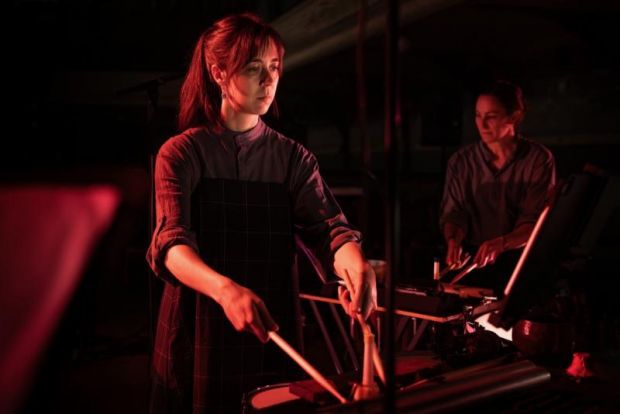
Susanne Dahn's review follows.
If you can fly, you can fall. The so-called bush rangers that are the subject of this oratorio knew this well. One minute crowds of thousands are gathering for a glimpse of you getting off a train, the next you’re alone awaiting the gallows.
Penalties for male homosexuality up until the mid-1800s were the same as for murder (death by hanging) though by the 1870s life imprisonment or hard labour became more common.
How lamentably difficult it must have been to know the drumbeat of your own identity, to have the sensibility of a romantic no less, to meet someone you love but then know that all you will experience is exclusion, lack of understanding, bitterness and ultimately vengeance and punishment. When there is no light, what is it to see.
This is the harsh, tragic and dramatic story of Moonlite. The story of 19th-century Australian gentleman ‘bushranger’ Captain Moonlite (Andrew George Scott) and petty thief James Nesbitt performed in the form of an oratorio or choral opera for percussion, viola and voices.
The score with some exceptions is equally harsh and dramatic, written as it is around a core of four percussionists (playing drums, xylophones, cymbals, blocks, bells and bowls) who build a relentless rhythm of injustice and oppression as the central tragic theme of this work.
The percussionists are Louise Devenish, Kaylie Melville, Hamish Upton, and Zela Papageorgiou.
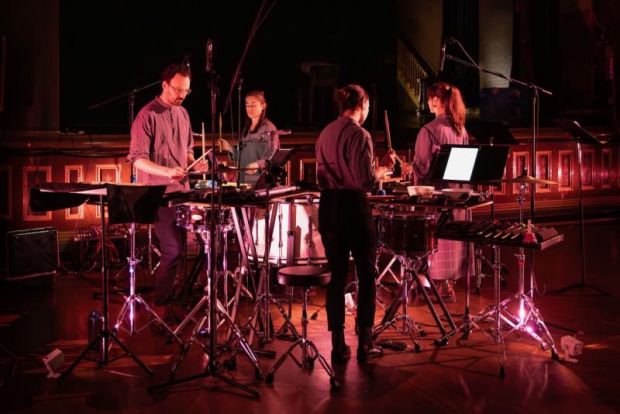
The single viola played by Phoebe Green weaves artfully with and between the percussion with affecting passages about the relentless rhythm of time, with solo interludes to embody the waxing and waning of Moonlite’s short life, with movingly expressive pizzicato playing and some hauntingly melodic moments that interplay evocatively with the six voices.
The composition is by Wally Gunn (Music) and Maria Zajkowski (Words) and it won the University of Melbourne’s Albert Maggs composition prize in 2019 and has previously been performed in New York, Philadelphia and Princeton.
Gunn is a respected Victorian composer who makes extensive use of patterns in his work, particularly in composing for percussion, also using speech, breath and movement to heighten the theatricality of performance. In Moonlite there is musicality in the smallest gestures.
Zajkowski is an award-winning poet, lyricist and librettist originally from New Zealand and now based in Melbourne. Her writing also uses patterns of interwoven text, of call and response, and this style powerfully demonstrates the internal struggles of queerness and the many voices we can have in our heads particularly when experiencing life’s extremes of love, longing, fear and death.
Andrew George Scott was not the stereotypical bushranger. The well-bred son of an Irish clergyman, educated as a civil engineer and with a untarnished military background in New Zealand, Scott immigrated to Australia and was working with the Anglican Church until something in the environment of the fading Australian gold rush of the late 1860‘s turned him first to bank robbery (romantically leaving a note signed as Captain Moonlite) and subsequently to the finer art of escaping from prison.
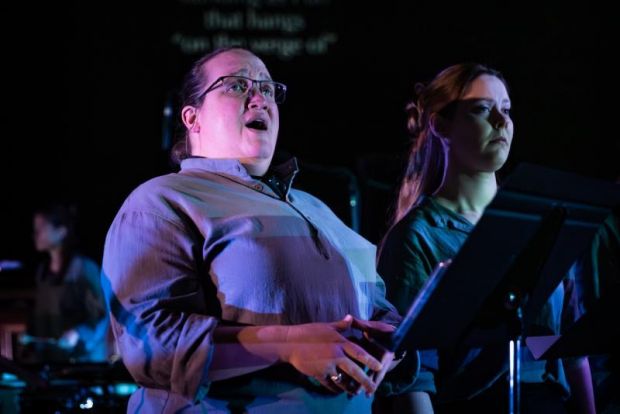
Scott and Nesbitt’s love began after they met at Pentridge Prison some time after 1875. By 1877/78 joint offences such as being idle together, speaking together during divine service and sharing tea were recorded.
Eight kilometres south of Pentridge in Fitzroy was where the star-crossed pair were finally able to re-unite and ‘live together’ in a boarding house after Scott was released in 1879. It would be more than 100 years before homosexuality was decriminalised in Victoria and New South Wales.
Scott‘s new part-time career as a public speaker about his criminal exploits was short lived however and he, Nesbitt and their small gang left Melbourne, where they were just too infamous to gain regular work, to travel north to try their luck.
Bad weather set in at the small settlement of Wantabadgery and hungry, cold, wet and desperate, the gang fatefully bailed up local residents to obtain supplies. The constabulary surrounded the gang, and one constable was killed, but not by Scott.
It was then that Nesbitt was also killed which rendered Scott inconsolable and he surrendered. Scott was wrongly found guilty of the murder of the dead constable and executed in Sydney.
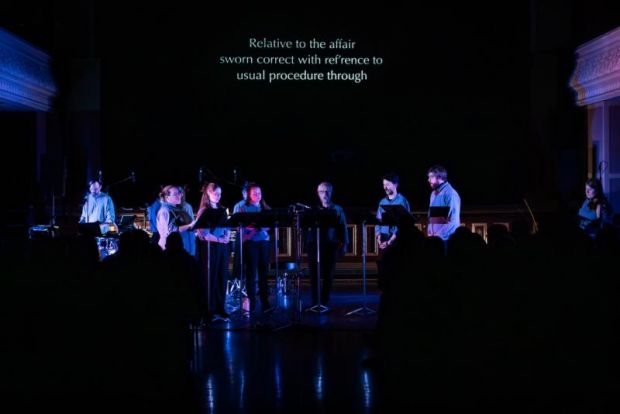
Scott died wearing a ring made of Nesbitt‘s hair and his last wish, poignantly rendered in a cache of unsent letters, was that he be buried with Nesbitt “the man with whom I was united by every tie which could bind human friendship, we were one in hopes, in heart and soul and this unity lasted until he died in my arms."
Finally, a century later after the discovery of the unsent death cell letters, Scott’s remains were exhumed from Rookwood Cemetery in Sydney and reinterred with a suitable headstone at Gundagai near to Nesbitt's unmarked grave in January 1995. The fate of unjoined halves so bitter in life, could be sweetened at the very end.
For me the highlights of the performance are the ethereally beautiful voices of the vocalists of The Consort of Melbourne. In this production they are Katherine Norman (Soprano), Kristy Biber (Soprano), Elspeth Bawden (Soprano), Timothy Reynolds (Tenor), Jack Jordan (Tenor) and Lachlan McDonald (Baritone).
McDonald in "There I met and As ever man did" is awesome as is Reynolds in "Walked I think twelve miles". Norman is celestial in "Landscape talking" as are all the sopranos when they combine in high range. The baritone/tenor duet that starts "Every tie which could bind" is spellbinding. The whole composition affords the ensemble such brilliant opportunity to showcase their technical control, the individual mastery and their generous collaboration especially in the opening and reprises of "Power and brilliancy" and the staccato "How much the wretched dare".
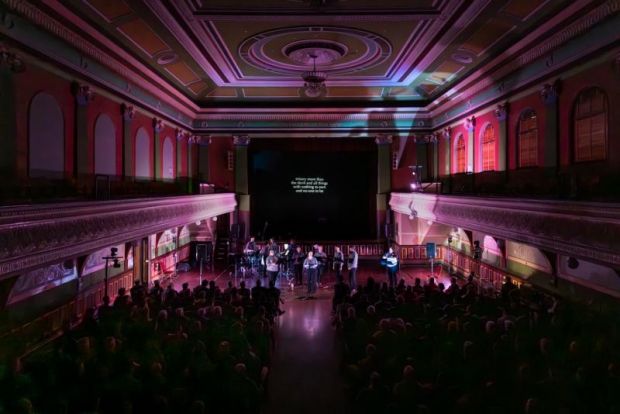
We owe this production to the joint Artistic Directors of Homophonic! Miranda Hill and the Consort of Melbourne Steven Hodgson.
Hill is an indomitable champion of LGBTQIA+ musicality creating ensembles of brilliant chamber performers that revive old and commission new compositions with eternal themes to audiences for whom LGBTQIA+ content is scarce and sometimes invisible.
Hodgson has masterfully led the Consort for nearly a decade now as together they have delighted audiences with the highest level of choral excellence in performance.
This is a brittle, unsettling and unhappy story of love both punished and unfulfilled. But the weave and weft of the drumbeat demanding justice can never be silenced and the uplifting majesty of music spun of voice to lift our hearts and spirits will always prevail.
It was wonderful to be at the sold-out Australian premiere of this production at Fitzroy Town Hall. Audiences in Shepparton, Ballarat and Port Fairy can enjoy this unique performance from August to October.
Susanne Dahn
Photographer: Darren Gill
Subscribe to our E-Newsletter, buy our latest print edition or find a Performing Arts book at Book Nook.

